 Petzlover
Petzlover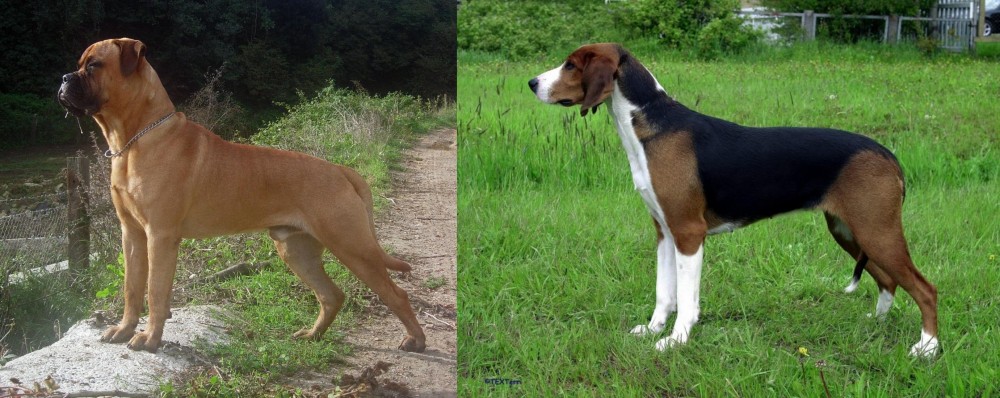 Bullmastiff is originated from United Kingdom but Finnish Hound is originated from Finland. Bullmastiff may grow 6 cm / 3 inches higher than Finnish Hound. Bullmastiff may weigh 34 kg / 75 pounds more than Finnish Hound. Both Bullmastiff and Finnish Hound has same life span. Both Bullmastiff and Finnish Hound has almost same litter size. Both Bullmastiff and Finnish Hound requires Low Maintenance.
Bullmastiff is originated from United Kingdom but Finnish Hound is originated from Finland. Bullmastiff may grow 6 cm / 3 inches higher than Finnish Hound. Bullmastiff may weigh 34 kg / 75 pounds more than Finnish Hound. Both Bullmastiff and Finnish Hound has same life span. Both Bullmastiff and Finnish Hound has almost same litter size. Both Bullmastiff and Finnish Hound requires Low Maintenance.
 The Old English Mastiff as well as the Bulldog are the breeds behind the Bull Mastiff. The Bullmastiff was originally developed in England around the 1860’s. Gamekeepers in England wanted a large, brave, robust dog which could help with keeping poachers away from their large estates which kept game.
The Old English Mastiff as well as the Bulldog are the breeds behind the Bull Mastiff. The Bullmastiff was originally developed in England around the 1860’s. Gamekeepers in England wanted a large, brave, robust dog which could help with keeping poachers away from their large estates which kept game.
As these large estates dwindled, so did the need for the services of the Bullmastiff and later they were simply bred to be family companions. As more Old English Mastiffs were bred, the dog became lighter, so that light tan or fawn became the preferred color.
The breed was officially recognized by the English Kennel Club in 1924, and the American Kennel Club in 1933.
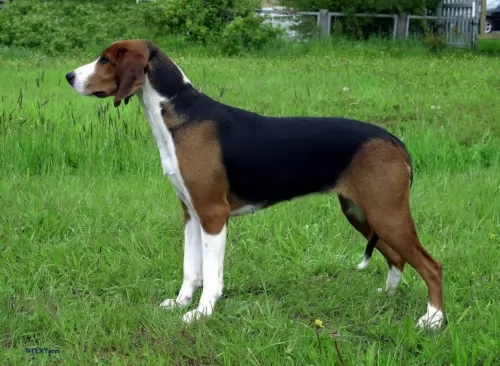 As one of Finland’s most popular dogs, the Finnish Hound isn’t particularly well known outside of Finnish borders. Known also as the Finsk Stovare, the Finnish Hound, known for its hunting skills, came about because of a breeding effort which started way back in the 1800s, mixing dogs such as different French, Swedish, and German hounds.
As one of Finland’s most popular dogs, the Finnish Hound isn’t particularly well known outside of Finnish borders. Known also as the Finsk Stovare, the Finnish Hound, known for its hunting skills, came about because of a breeding effort which started way back in the 1800s, mixing dogs such as different French, Swedish, and German hounds.
These hounds were used with the idea being to develop a dog that could do well in Finland’s terrain. The Finnish Hound is a great hunting dog but isn’t looked upon as an particularly awesome pet, although some pet owners would beg to differ.
 Bullmastiffs are large, brachycephalic dogs, and heights are between 61 and 68cm and the dog weight anything between 41 – 59kg. While it isn’t particularly tall, the dog is thickly set with a deep chest and strong, muscular legs. The Bull Mastiff has a powerful build and plenty of strength with an imposing look on his face. He is a powerful, active breed with a short coat which is also weather resistant and can be any shade of fawn, red or brindle.
Bullmastiffs are large, brachycephalic dogs, and heights are between 61 and 68cm and the dog weight anything between 41 – 59kg. While it isn’t particularly tall, the dog is thickly set with a deep chest and strong, muscular legs. The Bull Mastiff has a powerful build and plenty of strength with an imposing look on his face. He is a powerful, active breed with a short coat which is also weather resistant and can be any shade of fawn, red or brindle.
The dog has a black muzzle and the skull is large and square. The ears are set high and are short and floppy. The tail was once docked, giving the dog an even more distinctive, powerful appearance, but these days, due to regulations, the tail is left long.
The Bullmastiff is a loyal, devoted, fearless, protective dog. When he belongs to a human family, he becomes a companion but a fierce protector too, being a territorial dog. They love being with their family and can be good with children too, and even other pets, but proper training and socialization will be important. They aren’t aggressive around strangers, though he does make a wonderful guard dog.
He is intelligent and stubborn and if you don’t want him becoming destructive, even though he is a low-energy dog, you will need to exercise him and walk him every day.
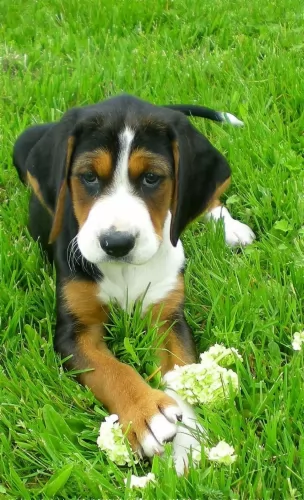 This is a medium sized dog who stands between 52 – 62cm in height and weighs in at 20 to 25kg. The Finnish Hound can have between 4 – 8 puppies.As a scent-hound, the Finnish Hound has a short, smooth double coat which is usually in a tri-color pattern of black, tan, and white.
This is a medium sized dog who stands between 52 – 62cm in height and weighs in at 20 to 25kg. The Finnish Hound can have between 4 – 8 puppies.As a scent-hound, the Finnish Hound has a short, smooth double coat which is usually in a tri-color pattern of black, tan, and white.
The attractive dog has an athletic, lean, muscular body full of energy and stamina. The eyes are brown and the dog has a peaceful expression. The medium length ears are floppy and the tail is long and carried low.
The Finnish Hound is friendly, calm and never aggressive. He is an intelligent dog nd will respond to the training and socialization he will require to turn him into an obedient, amicable pet, especially since he tends to be stubbon, independent and strong-willed. He isn’t recommended for small places in the city but will do better in the country with a fairy large piece of ground. The Finnish Hound is not recommended for apartment life. It is moderately active indoors and does best with at least an average-sized yard.
 Contrary to his formidable looks, the Bullmastiff is a gentle, affectionate pet when he has been properly socialized. He is a great pet for families and will guard them with his life. He is loyal and devoted but can be somewhat aloof, particularly with strangers.
Contrary to his formidable looks, the Bullmastiff is a gentle, affectionate pet when he has been properly socialized. He is a great pet for families and will guard them with his life. He is loyal and devoted but can be somewhat aloof, particularly with strangers.
He isn’t a highly energetic dog and he is more or less low maintenance and easy-going. Feed him correctly, give him a nice, warm sleeping spot to call his own and give him attention like he deserves as a family member. The Bullmastiff will reward you by being a solid and devoted companion.
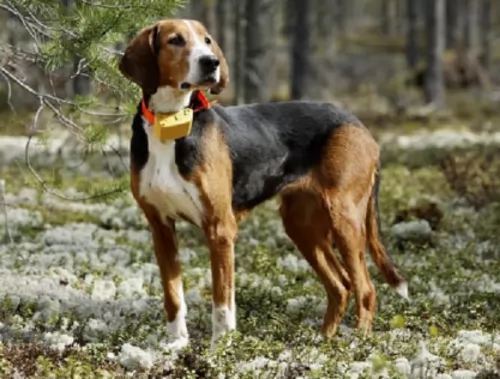 The Finnish Hound has always been a working dog and so he will require being well exercised.
The Finnish Hound has always been a working dog and so he will require being well exercised.
He makes a good pet with homes where there are other dogs as well as children. As a hunting or working dog, these days the Finnish Hound is also regarded as a companion animal, fitting into family life well, and turning out to be a loving, loyal pet.
 The Bullmastiff is a generally healthy breed, but even so, the breed is known for having to contend with certain health issues. He doesn’t have a particularly long life span either and can live to be about 10, ll or 12 years of age. Some of the more common illnesses to look out for include -
The Bullmastiff is a generally healthy breed, but even so, the breed is known for having to contend with certain health issues. He doesn’t have a particularly long life span either and can live to be about 10, ll or 12 years of age. Some of the more common illnesses to look out for include -
This is a condition where the thighbone doesn’t fit properly into the hip joint. The troublesome part is that it can lead to arthritis, pain and lameness for your pet.
This is a worrisome, life-threatening condition for a dog, particularly for large, deep-chested dogs such as your Bullmastiff. Instead of feeding your Mastiff one large meal, it is recommended to feed him 2 smaller meals. Bloat occurs when the stomach is distended with gas or air and twists, restricting the normal return of blood to the heart.
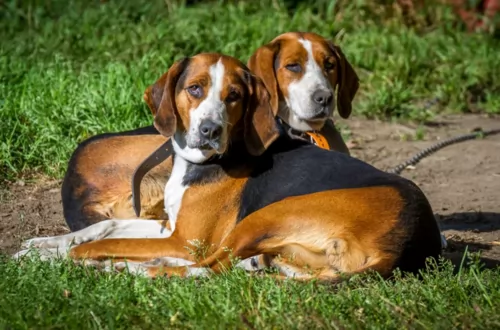 The Finnish Hound is looked upon as a generally healthy breed who can get to 12 years of age if looked after well. Good nutrition plays a huge role towards excellent health.
The Finnish Hound is looked upon as a generally healthy breed who can get to 12 years of age if looked after well. Good nutrition plays a huge role towards excellent health.
Check out common health ailments that can affect most dogs such as dental disease, obesity, hip dysplasia and a serious condition for which these dogs are particularly known – cerebellar ataxia. Lesions in the brain affect the dog’s coordination and sight. Get him to the vet as soon as you detect anything unusual with your pet.
 The Bullmastiff has a short dense coat which is looked upon as low-maintenance. He will require a brushing twice a week, being a light to average shedder. He is a dog that tends to drool quite a bit so you may need to wipe away slobber from time to time. Because his face has wrinkles, check the creases to ensure they remain free of dirt and food particles to ward off infection.
The Bullmastiff has a short dense coat which is looked upon as low-maintenance. He will require a brushing twice a week, being a light to average shedder. He is a dog that tends to drool quite a bit so you may need to wipe away slobber from time to time. Because his face has wrinkles, check the creases to ensure they remain free of dirt and food particles to ward off infection.
Check his ears at the same time, brush his teeth at least twice a week with special dog-toothpaste and brush and keep the nails trimmed.
Your large Bullmastiff will require high-quality commercial dog food but he will also need some home-made food in between such as rice, vegetables and meat. He is a large dog and will have to get an intake of raw meat too. Dogs denied raw meat can end up with skin problems as well as other health issues.It is better to feel your Bullmastiff smaller meals than to give him one large meal which he scoffs down quickly. Smaller meals will help prevent the most dangerous illness known as Bloat.
Ensure he has a steady supply of fresh, cool water.
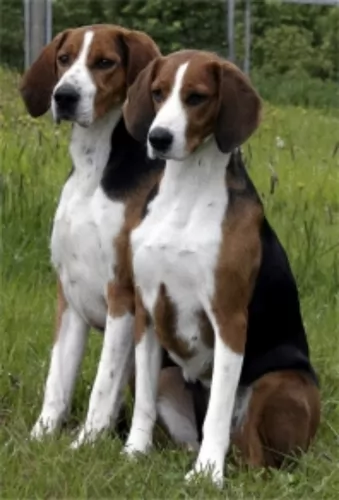 As a medium-sized dog breed, you want to make sure to feed your dog a high-quality commercial dog food – one that has been formulated with the right amount of vitamins and minerals for the type of dog he is.
As a medium-sized dog breed, you want to make sure to feed your dog a high-quality commercial dog food – one that has been formulated with the right amount of vitamins and minerals for the type of dog he is.
He is a high-energy hunting breed, so you wan to find a food that is appropriate to his needs. Home cooked brown rice, vegetables and chicken can be added into his kibble as a change and a treat from time to time as well as some raw meat occasionally. Make sure he always has access to fresh, cool water.
Physically active and mentally balanced and intelligent, the Finnish Hound will require both physical and mental stimulation to prevent him from becoming bored and frustrated.
As an average shedder, your pet's smooth, short-haired coat is easy to keep in tip top condition. All that is really required is to brush the coat down twice a week to keep it in peak condition.
Don’t neglect to check the inside of the dogs ears, as too much dirt and wax can cause nasty ear infections. Also, the teeth need to be brushed at least 2 or 3 times a week with special canine toothpaste and toothbrush. This will ward off tooth decay and lots of other problems within the body brought about by bad teeth.